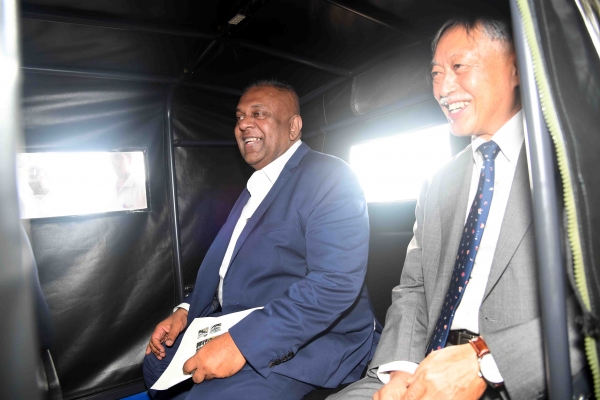Finance and Media Minister Mangala Samaraweera said the introduction of electric three-wheelers was an important new policy mainly due to environmental concerns.
"As part of the Paris agreement, Sri Lanka has pledged to reduce greenhouse gas emissions by 10% in the transport sector by 2020. Among the host of recommendations, one way to achieve this reduction is to convert the existing vehicles to ‘zero-emission’ vehicles, which would cause minimum levels of pollution and carbon footprint," Samaraweera said, addressing an event at Waters Edge, in Battaramulla, yesterday.
He also added, "The number of three-wheelers in Sri Lanka has increased eight-fold since the year 2000. The fuel consumption per person has increased from 90 litres to 150 litres during the same time. In 2017, Sri Lanka spent nearly USD 3.5 B to import fossil fuels for the generation of electricity and transportation. This is equivalent to around 4% of GDP. Therefore, Sri Lanka needs a longer term sustainable solution to mitigate the negative environmental consequences that arise as well as a solution to minimise the forex outflows from the country.
As a result, the vehicle policy in the 2018 budget too was designed to incentivise to move to a greener fleet of vehicles. The excise tax is structured such that diesel and petrol vehicles are taxed at a higher rate, making hybrids and electric vehicles more attractive. The loan to value ratio for electric and hybrid vehicles is also more favourable to encourage this segment of the market.
Additionally, the import taxes on a diesel three-wheeler will be increased by Rs. 50,000 to encourage the transition to environmentally friendly alternatives. Furthermore, under the Enterprise Sri Lanka credit schemes, the Ministry of Finance will incorporate a subsidised loan scheme to enable three-wheeler drivers to invest in a multitude of additional services including meters, WIFI, GPS facilities, that would act as value-added services that are already provided to consumers; both domestic and tourists. We are also developing a proposal to encourage entrepreneurship amongst the spouses of three wheeler drivers.
I am indeed encouraged by the electric three-wheeler developed by Japan Sri Lanka Comprehensive Partnership secretariat and T-PLAN. It is considered to have incorporated some of the cutting-edge technology available in this industry. I understand that the first batch of electric three wheelers manufactured in Sri Lanka will be ready by mid-2020, in time for the 2020 Tokyo Olympics. It is very exciting to hear that T-PLAN hopes to export the Sri Lankan made electric vehicles to Japan. This would be the first of many technology transfer projects that are currently being incubated by the Japan Sri Lanka Comprehensive Partnership secretariat."










